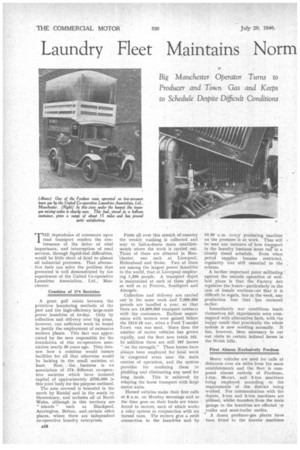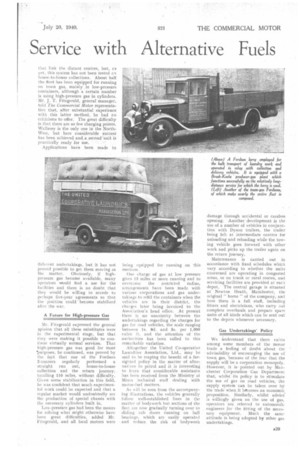Laundry Fleet Maintains Norm Service with Alternative
Page 38

Page 39

If you've noticed an error in this article please click here to report it so we can fix it.
C0:0 PqR
Fuels
Big Manchester Operator Turns to Producer and Town Gas and Keeps to Schedule Despite Difficult Conditions THE dependence of commerce upon road transport renders the continuance of the latter of vital importance, and interruption of road services, through liquid-fuel difficulties, would be little short of fatal to almost all industrial processes. That alternative fuels can solve the problem thus presented is well demonstrated by the experiences of the United Co-operative Laundries Association, Ltd., Manchester,
Combine of 174 Societies
A great gulf exists between the primitive laundering methods of the past and the high-efficiency large-scale power laundries of tø-day. Only by collection and delivery over big areas, however, can sufficient work be found to justify the employment of extensive modern plants. This fact was appreciated by the men responsible for the foundation of this co-operative association nearly 30 years ago. They foresaw how a combine would ensure facilities for all that otherwise would be lacking in the small societies at least. Now, the business is an association of 174 different co-operative societies which have invested capital of approximately £750,000 in this joint body for the purpose outlined.
The area covered is bounded in the north by Kendal and in the south by Sbrewsbury, and includes all of North Wales, although in this territory are " islands " such as Blackpool, Accrington, Bolton, and-certain other places, where there are independent co-operative laundry enterprises. From all over this stretch of country the weekly washing is collected and sent to half-a-dozen main establishments where the work is carried out. ,Three of these are situated in ManChester, one each at Liverpool, Birkenhead and Stoke. Two of them are among the largest power laundries in the world, that at Liverpool employing 1,300 people. A transport depot is maintained at each of these places. as well as at Preston, Southport and A bergele.
Collection and delivery are carried out in the same week and 7,000,000 parcels are handled a year, so that there are 14,0,00,000 transport contacts with the customers. Earliest experiences with-motors were gained before the 1914-18 war, when a Ford T-model 7-cwt, van was used. -Since then the number of motor vehicles has grown rapidly, and the fleet now totals 161. In addition there are still 187 horses " on the strength." These horses have always been employed for local work in congested areas near the main centres of operation, and the system provides for confining them to plodding and eliminating any need for long hauls. This is achieved by relaying the horse transport with large motor units.
Horsed vehicles make their first calls at 8 a.m. on Monday mornings and as the time goes on their loads are transferred to motors, each of which works a relay system in conjunction with six horsed vans. The motors give a swift connection to the laundries and by 10.30 am. every producing machine on the premises is at work. Thus will be seen one instance of how transport in the laundry business must rurr to a closely timed schedule. Even when petrol supplies became restricted, regularity wag still essential to the scheme.
A further important point militating against the smooth operation of welllaid plans is that the Factory Act regulates the hours—particularly in the case of female workers—so that it is difficult to regain, late in the week, any production loss that has occurred earlier.
Immediately war conditions made themselves felt ekperiments were commenced with alternative fuels, with the happy result that practically the whole system is now working normally. It has, however, been necessary to cut Out visits to certain isolated farms in the Welsh hills..
Fleet Almost Exclusively Fordson
Motor vehicles are used for calls at distances over six miles from the main establishments and the _fleet is composed almost entirely of Fordsons, 1-ton, 30-cwt, and 2-ton machines being employed according to the requirements of the district being worked. For communication with the depots, 2-ton and 3-ton machines are utilized, whilst transfers from the main garage to the laundries are effected ..ry trailer and semi-trailer outfits.
A dozen producer-gas plants have been fitted to the heavier machines
that link the distant centres, but, ,Fs yet, this system has not been tested c.n house-to-house collections. About half the fleet has been equipped for running on town gas, mainly in low-pressure containers, although a certain number is using high-pressure gas in cylinders. Mr. J. T. Fitzgerald, general manager, told The Commercial Motor representative that, after substantial experience with this latter method, he had no criticisms to offer. The great difficulty is that there are so few charging points. Wallasey is the only one in the NorthWest, but here considerable success has been achieved and,a_second'unit is
practically ready for use. • Applications have been made to
different undertakings, but it has not proved possible to get them moving in the matter. Obviously, if highpressure gas became available, many operators would find a use for the facilities and there is no doubt that they would be willing to accede to perhaps five-year agreements so that the position could become stabilized after the war.
A Future for High-pressure Gas
Mr. Fitzgerald expressed the general opinion that all these substitutes Were in the experimental stage, but that they were making it possible to continue virtually normal services. That high-pressure gas was good for most 'purposes, he continued, was proved by the fact that one of the Fordson 2-tonners regularly performed a straight run out, house-to-house collection and the return journey, totalling 110 miles, without difficulty. Given some stabilization in this field, he was confident that much experimental work could be expected and that a regular market would undoubtedly see the production of special chassis with the necessary cylinders built in.
Low-pressure gas had been the means for solving what might otherwise have been great difficulties, added Mr. Fitzgerald, and all local motors were being equipped for running on this medium.
One charge of gas at low pressure gives 15 miles or more running and to overcome the restricted radius, arrangements have been .made with various corporations and gas undertakiugs to refill the containers when the vehicles are in their district, the charges later being invoiced to the Association's head office. At present there is no unanimity between the undertekings regarding the charges for gas for road vehicles, the scale ranging between Is. 8d. and 5s. per 1,000 cubic ft. and the attention of the authorities has been called to this remarkable variation.
Altogether the United Co-operative Laundries Association, 'Ltd., may be said to he reaping the benefit of a farsighted policy in the matter of alternatives to petrol and it is interesting to learn that considerable assistance has been received from.the Ministry ot Mines technical staff dealing will motor-fuel matters.
As will be seen from the accompanying illustrations, the vehicles generally follow well-established lines in the matter of bodywork but sections of the fleet are now gradually turning over to sliding cab doors running on ball bearings, which are easily operated and reduce, the risk of 'bodywork
damage through accidental or careless opening. Another development is the use of a number of vehicles in conjunction with Dyson trailers, the trailer being left at intermediate centres for unloading and reloading while the towing vehicle goes forward with other work and picks up the trailer again on the return journey.
Maintenance is carried out in accordance with fixed schedules which vary according to whether the units concerned are operating in congested areas, or on trunk or rural routes, and servicing facilities are provided at each depot. The central garage is situated at Newton Heath, Manchester, the original " home " of the company, and here there is a full staff, including fitters and electricians, who carry cat complete overhauls and prepare spare units of all kinds which can be sent out to the depots whenever necessary.
Gas Undertakings' Policy We Understand that there exists among some members of the motor trade a feeling of doubt about the advisability of encouraging the use of town, gas, because of the fear that the supply will be a corporation monopoly. -However, it ispointed out by Manchester Corporation Gas Department that; whilst its policy is to stimulate the use of gas on road vehicles, the supply system can be taken over by the trade when it becomes an economic proposition. Similarly, whilst advice is willingly given on the use of gas, operators are referred to automobile engineers for the fitting of the necessary equipment. Much the same attitude is being adopted by other gas undertakings.




























































